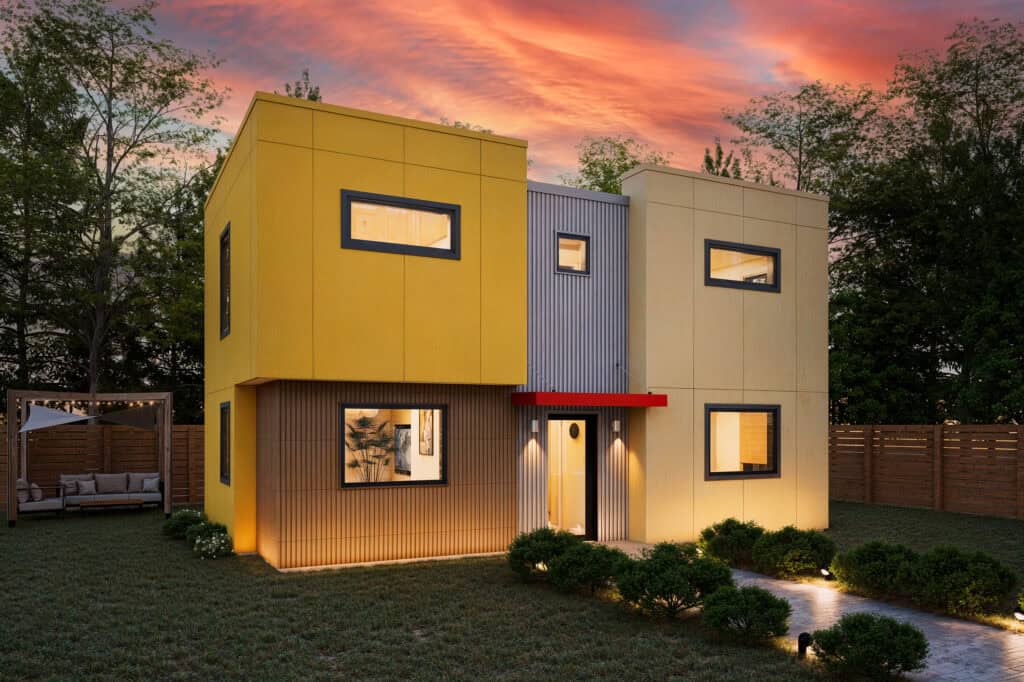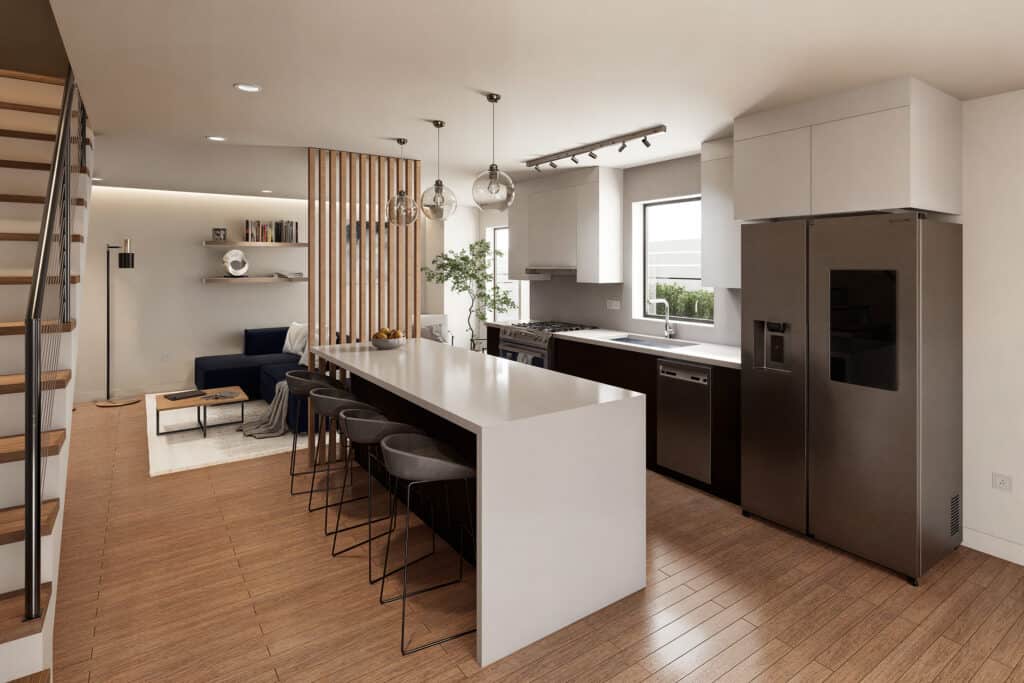Accessory Dwelling Units

An Accessory Dwelling Unit (ADU) is a legal housing unit that can be constructed within or as an addition to an existing home or, in some cases, a new detached structure. States, cities and towns have different regulations that specify where ADUs can be built and what cities and towns are allowed to require and enforce. In Massachusetts and Rhode Island, new ADU laws have made it possible for thousands of property owners to build a legal ADU. An ADU typically requires a separate entrance, kitchen and sanitary facilities and must meet all building and fire safety codes.
States in New England and nationwide are quickly realizing the power ADUs have to quickly add quality housing to the market, stabilize rental price appreciation, give families the freedom to build the housing they need or earn additional income from their property.

- Rapid Housing Development: ADUs help communities take advantage of unused space in existing structures, sustainably adding quality and safe housing units to the market.
- Stabilize Housing Costs: The rapid development of housing units is a proven tool used in efforts to stabilize and lower the cost of rental homes.
- Much Needed Income: Homeowners can develop an additional income stream by building and renting out an ADU, if local ADU laws permit non-owner occupants.
- Housing for Seniors and Family: ADUs empower families to choose the best housing situation for their needs. Seniors can choose to age safely in-place, near loved ones and caretakers, or earn additional money to supplement a fixed retirement budget.
Common Types of ADUs

Basement ADU

Attic ADU

Addition ADU

Detached Garage ADU

Attached Garage ADU

Backyard ADU
State ADU Laws

Current Rhode Island State ADU Law effective 6/25/2024 (H 7062 Sub A)
- ADUs are allowed by right on 1-4 unit properties
- The property and the ADU do NOT need to be owner-occupied
- The proposed ADU needs to be located within the existing footprint of the primary structure or existing accessory attached or detached structure
- Existing structures cannot be made larger (there may be exceptions to this)
- On lots 20,000 sq ft or larger, a new detached ADU can be built (there may be exceptions to this in certain municipalities)
- Unless the municipality establishes a different max unit size, the ADU must be a studio or 1-bedroom no larger than 900 sq ft (or the lesser of 900 sq ft and 60% of the principal dwelling) OR a 2-bedroom ADU no larger than 1,200 sq ft (or the lesser of 1,200 sq ft and 60% of the principal dwelling)
- Property owners can rent an ADU to anyone
- No infrastructure improvements to the property are required unless to comply with building code, capacity requirements or upgrades necessary to accommodate the ADU
- No zoning approval required if the ADU is in an existing footprint of the primary or accessory structure
- 1 parking space is required, unless the municipality removes this requirement, which some are doing
- ADUs can be part of a new construction development
- Any legal ADU remains legal and permitted upon transfer of title or occupancy
- ADUs can potentially be developed as part of a condo
- ADUs built in Rhode Island cannot be listed for short term rental through a hosting platform like Airbnb or VRBO

Current Draft Massachusetts State ADU Law effective 2/2/2025 (Section 8, Chapter 150 of the Acts of 2024)
- ADUs are allowed by right on single-family properties, though some municipalities like Boston may allow an ADU on 2-4 unit properties as well.
- The property and the ADU do NOT need to be owner-occupied.
- Unless the municipality establishes a different max unit size, the ADU must be a maximum of 900 sq ft or no more than half the gross floor area of the principal dwelling, whichever is smaller.
- Municipalities cannot require any ADU to be attached or detached from the primary dwelling.
- No more than 1 parking space is required, unless the municipality removes this requirement. No parking is required for ADUs located within 0.5 miles from a commuter rail station, subway stattion, ferry terminal or bus station.
- ADUs cannot be restricted by unit caps or density limits set by municipalities.
- ADUs cannot be held to design standards that would not be applied to a single-family home in the same zoning district.
- ADUs cannot be required to meet dimensional standards, including setbacks, lot size, lot coverage, bulk and height standards, that would be more restrictive than how single-family homes are treated in the same zoning district.
- Most municipalities in Massachusetts will not allow ADUs to be listed for short term rental (STR) through a hosting platform like Airbnb or VRBO, but some municipalities may choose to allow it. State law leaves that up to the municipality.
- Requirements by any municipality concerning tilities, safety, environmental regulation, site plan review, and impact analysis studies cannot be more restrictive than they would be for a single-family home.
- Municipalities may be allowed to establish design standards for ADUs in Historic Districts, but not so restrictive that it prohibits ADU development or unreasonably increases the cost of ADU use or construction.
- Special Permits will be required to build multiple ADUs on one single-family lot.

Current Connecticut State ADU Law effective 1/1/2022 (Section 6, Public Act No. 21-29)
- Note: cities and towns were given until 1/1/2023 to adopt these regulations or go through a public process to opt-out of these regulations. 115 towns in CT opted out of the state’s ADU law. 54 towns did not opt out. However, many of the towns that opted out amended their own ADU regulations. 67% of CT municipalities allow for ADUs that partially satisfy the state law.
- Accessory units must be allowed at least on all lots that contain a single family dwelling.
- ADUs cannot be required to be affordable.
- ADUs can be attached, located within the proposed or existing principal dwelling, or detached on the same lot.
- Municipalities can set a maximum floor area for ADUs, not less than 100 sq ft or 30% of the floor area of the principal dwelling, whatever is smaller. Municipalities CAN choose to allow for larger ADUs.
- Municipalities must require setbacks, lot size and building frontage less than or equal to that which is required for the principal dwelling, and require lot coverage greater than or equal to that which is required for the principal dwelling.
- Municipalities cannot set height, landscaping or architectural design standards that exceed that of single family dwellings.
- A passageway between ADUs and the principal dwelling is NOT required.
- A maximum of 1 parking space can be required.
- ADUs do NOT need to be owner occupied and can be rented to anyone regardless of relationship with the property owner or age.
- Municipalities cannot require renewals for permitted ADUs.
- Municipalities may establish bans on short term rental use for ADUs.
- Permit and review process cannot exceed 65 days.
- No fire sprinklers are required if they are not required in the principal dwelling.
- ADUs do not require a new or separate utility connection.
